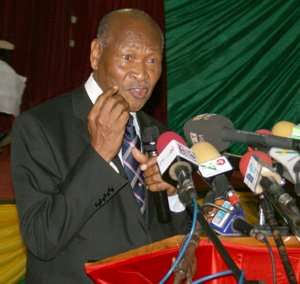
Accra, July 21, GNA - Rotary International, in collaboration with United States Agency for International Development (USAID), has organised a policy advocacy training workshop for members as part of its water and sanitation project.
The workshop is aimed at strengthening the advocacy capabilities of Rotarians to champion the improvement in WASH services in some schools, clinics and communities.
Mr Sam Okudjeto, Past International Rotarian Co-ordinator, said Ghana had estimated that by 2025 there would be adequate, safe, affordable and reliable water supply and sanitation for all across the country, thus the introduction of the Water Sanitation and Hygiene (WASH) programme.
He said safe sanitation and hygiene had gradually become a fundamental human right of all people, as human survival depends greatly on water.
He said although water supply had gradually improved in Ghana, it was estimated that 60 per cent of rural water pumps had broken down, and 64 per cent of households rely on well as their major source of water.
Mr Okudjeto said the district assemblies and local authorities were faced with a lot of problems and the introduction of the WASH programme as well as the skills acquired would help ensure the water and sanitation projects were sustained.
'Rotarians are expected to step down the training to the project sub committees at the local levels and be advocate to the project by organising community durbars, media interactions, lobbing and build networks to help sustain the project.'
Dr Naana Agyemang-Mensah, Member, Host Organising Committee, said the workshop was also to improve the knowledge and skills of Rotarians to use community score cards to identify and address barriers to promote improvement in WASH services.
It is also aimed at increasing the knowledge and skills of Rotarians to conduct policy dialogue, plan lobbing events, sensitise them on the role of the media in advocacy improvement and to use community durbars to mobilise and educate communities.
She said there was the need for high commitment for Rotarians to be able to make an impact on communities through the project by informing and influencing decision makers at the national and sub-national levels based on evidence to make them want to cause policy changes and implementations.
Dr Agyemang-Mensah noted that access to toilet facilities across the country was 15 per cent, and the workshop would empower Rotarians to go back to the communities to empower them to demand these projects from policy makers.
Mr Ako Odotei, Chairman, Rotary Host Committee said water resource and sanitation formed part of Rotary's core focus and the Rotary International and USAID water and sanitation project was expected to improve community water supply services and sanitation for schools and clinics in some communities.
He said the $ 4 million project which was expected to be completed in 2020, was being embarked on in six regions across the country, 13 beneficiary districts and 165 communities.
The project is going to provide 94 water systems and 122 institutional latrines.
GNA
By Hafsa Obeng, GNA




 This IMANI job no dey pap; the people you are fighting for are always fighting y...
This IMANI job no dey pap; the people you are fighting for are always fighting y...
 Prof. Naana Opoku-Agyemang has changed; you can see a certain sense of urgency –...
Prof. Naana Opoku-Agyemang has changed; you can see a certain sense of urgency –...
 MFWA Executive Director slams Akoma FM for engaging in ‘irresponsible’ media pra...
MFWA Executive Director slams Akoma FM for engaging in ‘irresponsible’ media pra...
 ‘Women must become millionaires too’ — Prof Jane Naana on establishment of Women...
‘Women must become millionaires too’ — Prof Jane Naana on establishment of Women...
 Some believe only in Ghanaian votes, not Ghana — Kofi Asare jabs politicians
Some believe only in Ghanaian votes, not Ghana — Kofi Asare jabs politicians
 Plan to make BEST sole aggregator of Sentuo Oil Refinery will create market chal...
Plan to make BEST sole aggregator of Sentuo Oil Refinery will create market chal...
 2024 elections: I can't have the man I removed from office as my successor — Aku...
2024 elections: I can't have the man I removed from office as my successor — Aku...
 2024 Elections: Immediate-past NPP Germany Branch Chairman garners massive votes...
2024 Elections: Immediate-past NPP Germany Branch Chairman garners massive votes...
 Gov’t focused on making Ghana energy self-sufficient, eco-friendly – Akufo-Addo
Gov’t focused on making Ghana energy self-sufficient, eco-friendly – Akufo-Addo
 April 25: Cedi sells at GHS13.74 to $1, GHS13.14 on BoG interbank
April 25: Cedi sells at GHS13.74 to $1, GHS13.14 on BoG interbank
